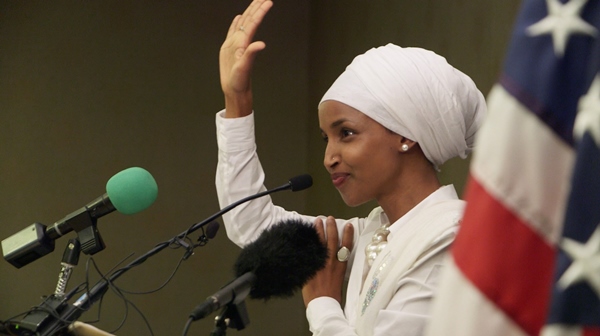This inspiring if somewhat conventional documentary follows Ilhan Omar during her history-making political campaign of 2015–2016 for a seat in the Minnesota House of Representatives. The first Somali American to hold public office in the country, as well as one of the first two Muslim women to do so, she faced considerable obstacles, including veteran incumbent Phyllis Kahn, who held the post for more than 40 years. But the earliest scenes highlight how Omar, who started out as a community activist, was able to connect with young people and minorities—two demographics that were key to enlarging the voter base and her winning.
In Minnesota’s District 60B, which includes a sizable Somali population and the University of Minnesota, poverty and student debt have become extremely pressing issues. Yet the existing political establishment wasn’t dealing with them as aggressively as some constituents would have liked, giving Omar an opening. In addition, young people, including those on the candidate’s staff, appear to be leaning progressive and not just liberal, making them more ideological akin to her. From the start, director Norah Shapiro establishes Omar as a fresh voice, including a clip from one of her initial rallies in which she references Tupac Shakur.
Omar’s personal and familial life includes a supportive husband who takes leave from his job to care for their children while she campaigns, as well as the kids themselves, who are bright and outspoken. It’s a warm and accessible family portrait that pushes back against the idea that as Somali Americans and Muslims, Omar and her clan are too much “the Other.”
But the meat of Time for Ilhan is the campaign itself, which it follows with clear-eyed efficiency, the stakes made clear at every step through captions. After opening her campaign office in January of 2016, Omar and her team need to convince voters to come out for her at the Democratic caucuses, which are scheduled in two months. We are a fly on the wall for a lot of the behind-the-scenes strategizing among Omar’s staffers, who stress out over whether they can energize enough college students and other young voters. Another concern is whether the presence of another candidate of Somali descent, albeit a male, will split Omar’s base and allow Kahn to retain her seat.
The race threatens to divide the Somali community along gender lines, as the Somali male candidate, Mohamud Noor, appeals to those who believe men should have leadership roles. Kahn, meanwhile, engages in some ugly rhetoric, including claims that Omar has gotten “whiter” in an attempt to sway minorities away from the upstart. Politics is, of course, an ugly business, but it’s a shame that Kahn is thoroughly dismissive of Omar as there are parallels between the two: each rebelled against societal expectations of them as women when they sought office. As for Noor, he comes across as an unwitting instrument of the establishment, whose refusal to unify the Somali community behind Omar nearly leads to disaster for her.
In any film about a political campaign, the candidate should have a moment in which they show their mettle, and Omar gets two. The first is during a radio interview featuring herself, Kahn, and Noor, in which Omar, despite being treated dismissively at first by the host, effectively distinguishes herself and what she stands for and brilliantly parries an attempted sneak attack by Kahn.
The other is during the Democratic-Farmer-Labor (or DFL) district convention in April, where Omar, despite having garnered the most votes in the caucuses, has to try and convince the other candidates’ delegates to switch sides. In a particularly tense moment, she confronts Noor about his refusal to encourage his supporters to back her instead. It doesn’t necessarily lead to the resolution we expect, but it’s nevertheless an instance in which Omar shows herself to be a potential force to be reckoned with.
During the battle to the DFL convention—and past it to the primary election in August—it’s easy to get caught up in the enthusiasm of Omar’s and Noor’s respective camps, each of which seizes on an opportunity to send a representative to Saint Paul. It’s a long journey that leaves Omar and her staff exhausted, even if the way in which the film was edited doesn’t always show just how exhausting it was. Unfortunately, the moments that should entail the thrill of victory are bittersweet instead. In one case, that is due to an unexpected scandal about Omar’s marital status, which is easily debunked, but not before news outlets spread the lie as widely as possible, especially conservative cable outlet Fox News.
The second is because of the presidential victory of Donald Trump, who at one point smears Minnesota’s Somali population on national television. While the November of 2016 results naturally cast a pall over Omar’s own, the film argues that the larger movement that she’s a part of—to bring more diversity to American politics—cannot be so easily derailed.
One could say the same thing at the present moment, as Congresswoman Omar has just been at the center of a controversy involving remarks construed as anti-Semitic. Putting aside my own opinion about them, the current backlash reminded me of the aforementioned attack on Omar based on unsubstantiated rumors, which one interviewee in the film said reflected a sad reality about America: that when those considered “the Other” manage to ascend, they immediately acquire a target on their backs. I assume we are simply watching the pattern repeat itself, but part of the pleasure of watching this documentary about Ilhan Omar is knowing that she’ll keep getting back up.
TIME FOR ILHAN – Official Trailer from Flying Pieces Productions on Vimeo.

















Leave A Comment